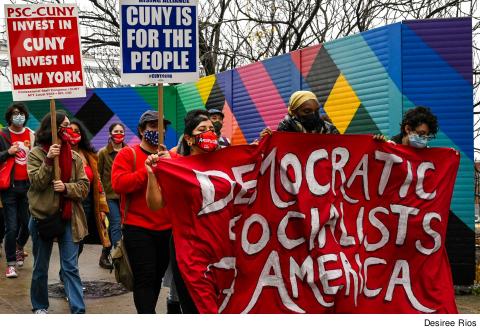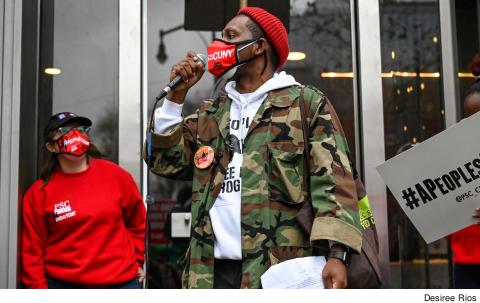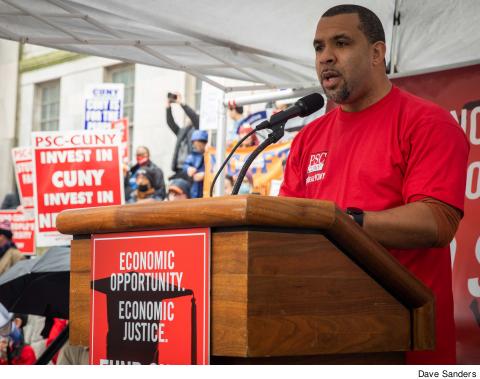Strong coalitions matter
 |
Over the past year, the New Deal for CUNY (ND4C) legislation, which seeks to transform state funding for CUNY, has generated increased attention and support among a wide range of organizations, labor unions and lawmakers. Additionally, the CUNY administration made a relatively ambitious budget request that begins to meet the needs of the university and the governor’s Executive Budget proposal adds an additional $120 million to CUNY’s budget.
The recently released one-house bills of the New York State Senate and Assembly have proposed that Governor Kathy Hochul increase her investment in CUNY by another $400 million, in an effort to move closer to achieving some of the budgetary goals found in the New Deal for CUNY. The PSC recognizes and greatly appreciates the proposed state budgets, Governor Kathy Hochul’s Executive Budget and the one-house budget agreed upon by State Senate Majority Leader Andrea Stewart-Cousins and State Assembly Speaker Carl Heastie. The PSC hopes to see the full amount proposed in the one-house bills in the final budget. The enormity of this shift in the funding structure of CUNY, and more generally, in public higher education, cannot be overstated. While some factors that play into this shift may have been unpredictable and sudden, others stem from years of persistent coalition building and the development of a piece of legislation that lays out the budget that CUNY needs to meet the educational aspirations of CUNY students, faculty and staff.
A VISION FOR CUNY
The New Deal for CUNY legislation packaged many of CUNY’s key needs into a budget and legislative “ask” that resonated with the politics and vision for CUNY of many influential groups. The Black, Puerto Rican, Hispanic, and Asian Caucus in the State Legislature endorsed ND4C, as did the New York City Council. Student groups in CUNY Rising Alliance (CRA), including such as NYPIRG, University Student Senate, Young Invincibles and the Young Democratic Socialists of America, all made the ND4C campaign a top priority.
 |
While the PSC does not yet know the final outcome of the state budget or whether the state will get as far as enacting ND4C legislation this year, the PSC does know that the crisis at CUNY is now getting the fiscal and public attention it deserves. Consequently, NYS public higher education institutions stand to see better funding in the final budget than they have seen in decades.
Six years ago, the PSC, along with a handful of other community organizations and unions, began to build the citywide coalition, CUNY Rising Alliance, which aims to secure the future of the City University of New York. With decades of underinvestment in the institution that has historically educated so many of New York’s poor and working families, Black and brown students and immigrants, the decimation of CUNY has become unconscionable, unsustainable and intolerable.
By helping form the CUNY Rising Alliance, the PSC broadened its reach and made greater inroads into transforming CUNY and setting ourselves up to make major gains in the short and long run. CUNY needed to become a crucial and impassioned issue to constituents beyond the university’s most immediate stakeholders. Other union members who attend CUNY, alumni, lawmakers and local leaders have been brought into the fold, so that activists, along with the PSC, can all advocate together to truly make CUNY the People’s University. It now needs to be treated and funded as such.
MASS MEETING
In 2016, CRA held an inaugural mass meeting with hundreds of students, union members (not just from the PSC) and community groups. They assembled for a march and mass meeting in a church in Midtown Manhattan. Over the next few years, with campus town halls, rallies, meetings, sign-on letters and press conferences, CRA attracted CUNY students and allies with the aim of sustaining the active participation across a range of organizations representing the people of New York City.
New York Communities for Change (NYCC), a community-based social justice organization, played an important structural role, helping to house and provide political and strategic direction for CUNY Rising Alliance. Monthly meetings of group leaders became the forum for collaboration, and by February 2020, CRA often had more than 30 people representing different groups who attended monthly meetings. Over time, it also became clear that in addition to one CRA staff person, student organizers and a second full-time staff member were needed to fully reach CRA’s potential. This was achieved through sustained organizational support from NYCC and steady financial support from the PSC and the American Federation of Teachers (AFT).
The CUNY Rising Alliance understood from the beginning the need to engage in struggle. Some campaigns were defensive, such as the effort to override then-Governor Andrew Cuomo’s intention to cut CUNY’s state support by $485 million and shift its fiscal obligation to the city. CRA and PSC, joined by other groups and individuals, managed to defeat that effort.
Other campaigns were offensive, such as the emphasis on what was needed to ensure quality education: a greater investment in ASAP (Accelerated Study in Associate Programs) that provides free transportation, support services and laptops for every student. A return to free tuition is a cornerstone of CRA’s campaign to transform state and city funding for CUNY. The historic examples of New York City students fighting for increased access to higher education – from the expansion of CUNY during the Great Depression to the fight for open admissions in the 1970s – helped to revive the struggle for a tuition-free CUNY.
VACUOUS PROMISE
But now, as in the 1960s and 1970s, access devoid of investment in quality education, is a vacuous promise. It was on this basis that the campaign to give all students the resources currently available only to those in ASAP, became a part of CRA’s organizing agenda. Just as in earlier decades, students continue to need a more diverse faculty and a more inclusive curriculum, as well as the all-around supports that can, at least in part, be achieved by small classes and fully staffed colleges.
 |
As in any coalition, groups come with different priorities and varying levels of commitment. Consequently, there are ebbs and flows to participation. Before COVID, there was steady participation from community organizations and unions; during the pandemic, there was a slow but steady rise in student participation. Inevitably, while activists coalesced around funding for CUNY, different organizations were comfortable with different language and tactics.
COVID made it difficult for all community groups, unions and coalitions to do their in-person organizing work. Groups hunkered down to survive in order to protect and help members and communities recover from loss and devastation. Eventually, along with the shock and trauma that people experienced during the pandemic, new kinds of community building and coalitions emerged. In the midst of COVID and ahead of the release of the 2021 state budget last year, the PSC and CRA joined the campaign to tax the wealthiest New Yorkers and worked closely with another alliance, Invest in Our New York.
Beginning in the winter of 2020, the first year of the pandemic, all of this new online organizing led to an astounding number of allies and CUNY students, who attended online zoom “actions,” town halls and meetings, as a growing coalition was built to campaign for a budget in support of a New Deal for CUNY.
In the fall of 2020, while this ambitious piece of legislation was being drafted and legislative sponsors were identified, groups in the CUNY Rising Alliance and the PSC Committee on Legislation shared spreadsheets tracking legislators’ support and met virtually with State Assembly members and senators to publicize the legislation and build sponsorship.
VIRTUAL MEETINGS
Together, activists met virtually with assembly members and senators to publicize the legislation and build sponsorship. In fall 2021, a dozen New York state labor unions sent a letter to the governor, the assembly speaker and senate majority leader, supporting investment in CUNY. The American Federation of Teachers’ student vaccination grant that the PSC received and CRA implemented drew more than 7,000 students to CRA to learn about ND4C, join CRA actions and enter laptop raffle drawings. As significant as the work inside CRA was, what was more impressive was that member groups were launching ND4C efforts within their own organizations.
Year after year, NYPIRG planned scores of highly organized legislative meetings that included students, faculty and staff. In 2022, Young Invincibles brought students to a “Students Take Albany Day” and met with legislators about ND4C and formed a “Students Rising” program to train activists using ND4C as their main initiative. Young Democratic Socialists of America (YDSA) joined CRA as a member organization after the New York City chapter of DSA voted to make ND4C one of its main New York City priorities. They proceeded to hold town halls, design attractive materials and set up tables outside many CUNY colleges.
In March 2022, DSA also organized its own trip to Albany, where members told their stories to legislators. These independent events reinforced the campaign efforts of CRA and the PSC. The work of member organizations ran parallel and often in tandem with the work of the PSC’s Legislative Committee, whose members, leaders and PSC staff worked tirelessly to strengthen relationships with legislators, by running local district “visits,” making city and state endorsement recommendations and building working relationships with the PSC and its allies. This month, Labor-Religion Coalition organized more than 130 faith and religious leaders to support CUNY and SUNY by signing a letter calling for significantly increased funding for both systems. The letter was sent to Governor Hochul, Senate Majority Leader Stewart-Cousins and Assembly Speaker Heastie.
A PROMISING YEAR
A year has gone by since CRA introduced the ND4C legislation, and the PSC launched its strategic budget and legislative campaign. Many PSC members have been motivated and activated during what has also been a year of leadership transition at the PSC. Clarion does not know, as of publication, the outcome of this year’s state budget. The CUNY Board of Trustees approved a state budget request that, for the first time in over a decade, was one that began to match the massive needs of the university. That request resembled the New Deal for CUNY.
In January, Governor Hochul announced in her proposed budget that she would make major investments in higher education and add $1.2 billion into the CUNY budget over the next five years. Building off what the governor proposed and what the leaders in both chambers of the state legislature put in their one-house budgets, the PSC has secured approximately $500 million for CUNY. It cannot be overstated how significant this is.
For two decades, under ever-worsening financial and political times, the PSC did not retreat. No matter the reception in Albany the union continued to lobby and build relationships, and in turn, power with other organizations and legislators, many of whom we helped elect. When threatened with dire cuts under previous administrations, the union fought not to break even, but to make gains.
The PSC has been prepared for this moment of opportunity. PSC members and coalition partners in CUNY Rising Alliance have confronted each challenge and opportunity, mustering up creative initiatives while still sustaining the day-to-day work of their organizations.

